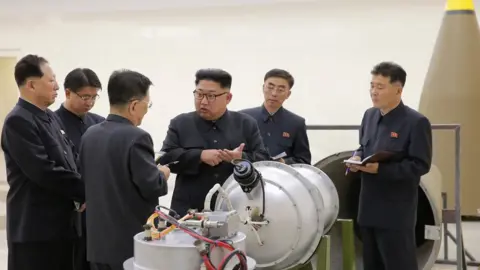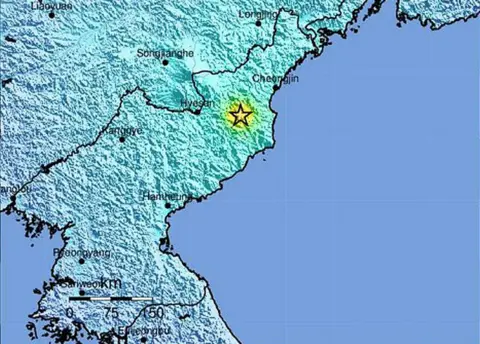North Korea nuclear test: Hydrogen bomb 'missile-ready'
North Korea says it has successfully tested a nuclear weapon that could be loaded on to a long-range missile.
The secretive communist state said its sixth nuclear test was a "perfect success", hours after seismologists had detected an earth tremor.
Pyongyang said it had tested a hydrogen bomb - a device many times more powerful than an atomic bomb.
Analysts say the claims should be treated with caution, but its nuclear capability is clearly advancing.
North Korea last carried out a nuclear test in September 2016. It has defied UN sanctions and international pressure to develop nuclear weapons and to test missiles which could potentially reach the mainland US.
South Korean officials said the latest test took place in Kilju County, where the North's Punggye-ri nuclear test site is situated.
The "artificial quake" was 9.8 times more powerful than the tremor from the North's fifth test, the state weather agency said.
It came hours after Pyongyang said it had miniaturised a hydrogen bomb for use on a long-range missile, and North Korean leader Kim Jong-un was pictured with what state media said was a new type of hydrogen bomb. State media said the device could be loaded on to a ballistic missile.
What does the test tell us?
A series of recent missile tests has caused growing international unease.
In a report on Sunday, the North's state news agency KCNA said Kim Jong-un had visited scientists at the nuclear weapons institute and "guided the work for nuclear weaponisation".
 Reuters/KCNA
Reuters/KCNAThe North has previously claimed to have miniaturised a nuclear weapon, but experts have cast doubt on this. There is also scepticism about the North's claims to have developed a hydrogen bomb.
However, this does appears to be the biggest and most successful nuclear test by North Korea to date - and the messaging is clear. North Korea wants to demonstrate it knows what makes a credible nuclear warhead.
Nuclear weapons expert Catherine Dill told the BBC it was not yet clear exactly what nuclear weapon design was tested.
"But based on the seismic signature, the yield of this test definitely is an order of magnitude higher than the yields of the previous tests."
Current information did not definitively indicate that a thermonuclear weapon had been tested "but it appears to be a likely possibility at this point", she said.
Hydrogen bombs use fusion - the merging of atoms - to unleash huge amounts of energy, whereas atomic bombs use nuclear fission, or the splitting of atoms.
What has the reaction been?
South Korean President Moon Jae-in said North Korea's sixth nuclear test should be met with the "strongest possible" response, including new United Nations Security Council sanctions to "completely isolate" the country.
China, North Korea's only major ally, condemned the test.
North Korea "has ignored the international community's widespread opposition, again carrying out a nuclear test. China's government expresses resolute opposition and strong condemnation toward this," the foreign ministry said in a statement.
Japan's Chief Cabinet Secretary Yoshihide Suga said sanctions against North Korea should include restrictions on the trade of oil products.
Russia meanwhile said the test defied international law and urged all sides involved to hold talks, saying this was the only way to resolve the Korean peninsula's problems.
The head of the International Atomic Energy Agency, the global nuclear watchdog, described the test as "an extremely regrettable act".
Yukiya Amano added: "This new test, which follows the two tests last year and is the sixth since 2006, is in complete disregard of the repeated demands of the international community."

How can the world respond?
Jonathan Marcus, BBC defence and diplomatic correspondent
North Korea's sixth nuclear test - probably its largest so far - sends out one clear political signal.
Despite the bluster and threats from the Trump administration in Washington and near-universal condemnation from around the world, Pyongyang is not going to halt or constrain its nuclear activities.
Worryingly, it also suggests that this is a programme that is progressing on all fronts at a faster rate than many had expected. So far all efforts to pressure North Korea - sanctions, isolation, and military threats - have all failed to move Pyongyang.
Could more be done? Certainly, but the harshest economic pressure would potentially cripple the regime and push it towards catastrophe - something China is unwilling to countenance.
Containment and deterrence will now come to the fore as the world adjusts its policy from seeking to roll-back Pyongyang's weapons programme to living with a nuclear-armed North Korea.

How did news of the test emerge?
The first suggestion that this was to be a far from normal Sunday in the region came when seismologists' equipment started picking up readings of an earth tremor in the area where North Korea has conducted nuclear tests before.
Initial reports from the US Geological Survey put the tremor at 5.6 magnitude with a depth of 10km (six miles) but this was later upgraded to 6.3 magnitude at 0km.
 EPA/USGS
EPA/USGSThen Japanese Foreign Minister Taro Kono said there was no doubt this was North Korea's sixth nuclear test.
Finally, in a radio broadcast that had been trailed as a "major announcement", North Korean state media confirmed this was no earthquake.

China embarrassed
Robin Brant, BBC News, Shanghai
North Korea's sixth nuclear weapons test is an utter rejection of all that its only ally has called for.
Beijing's response was predictable: condemnation, urging an end to provocation and dialogue. But it also spoke of urging North Korea to "face up to the firm will" of the international community to see denuclearisation on the Korean peninsula.
There is no sign though that China is willing yet to see that firm will go beyond UN sanctions, which recently clamped down on seafood and iron ore exports, in addition to the coal and minerals that are already banned from crossing the border.
It is noteworthy also that this test took place just as the Chinese president was about to welcome a handful of world leaders to the two-day showpiece Brics summit on China's east coast.
Even the state-controlled media will find it hard to ignore the fact that their man has been upstaged - embarrassed too - by its almost universally ostracised ally and neighbour.

Previous nuclear tests

